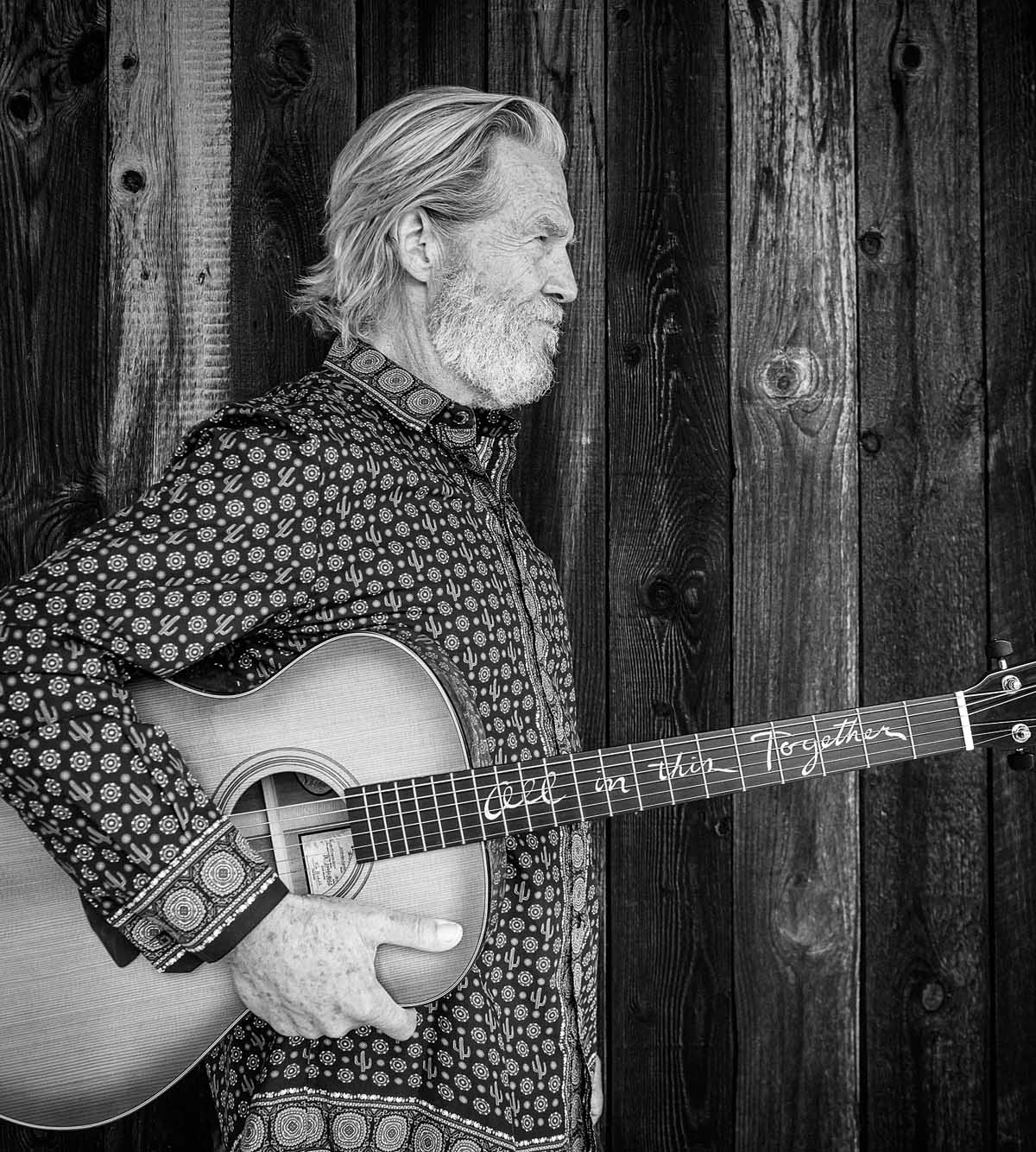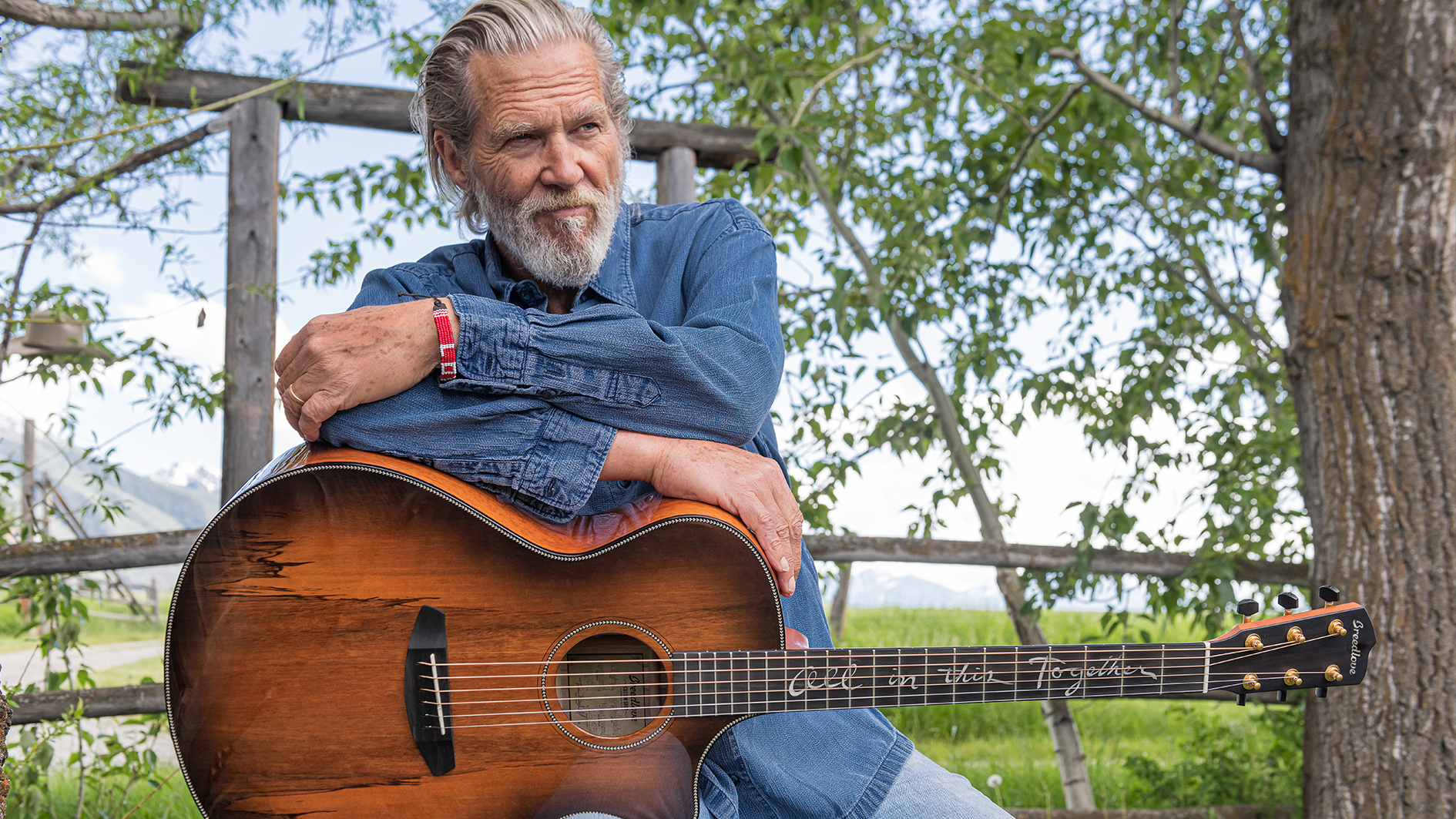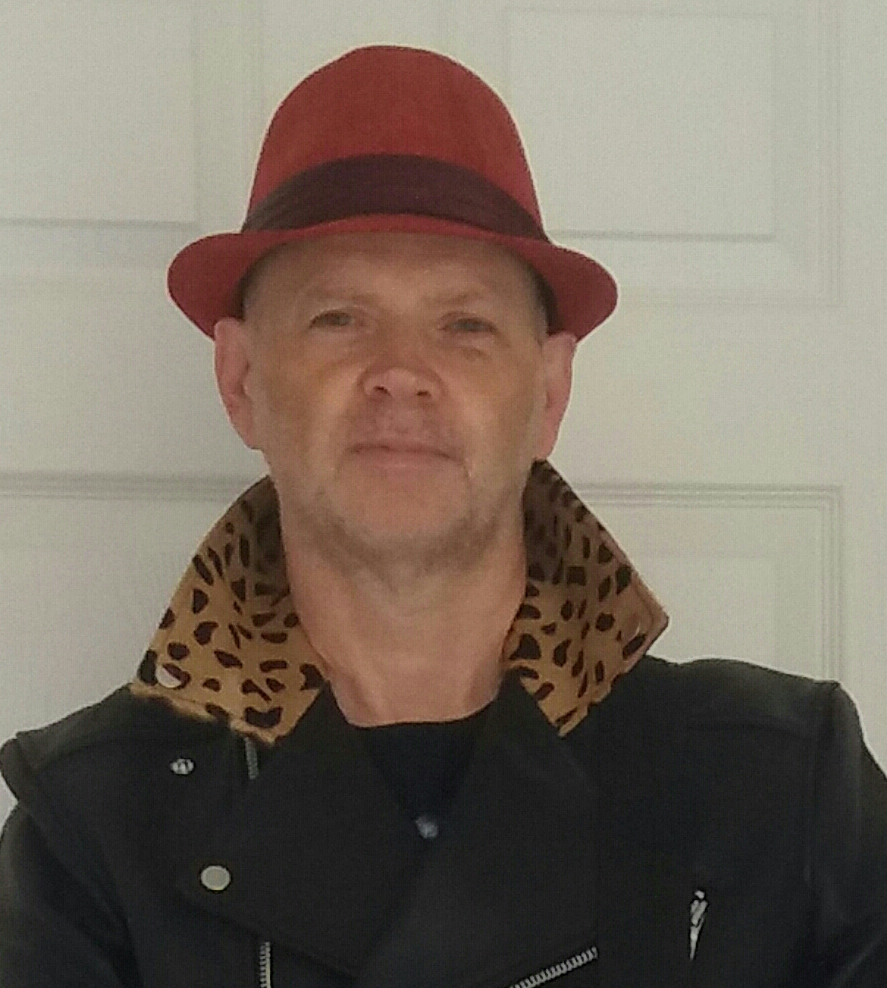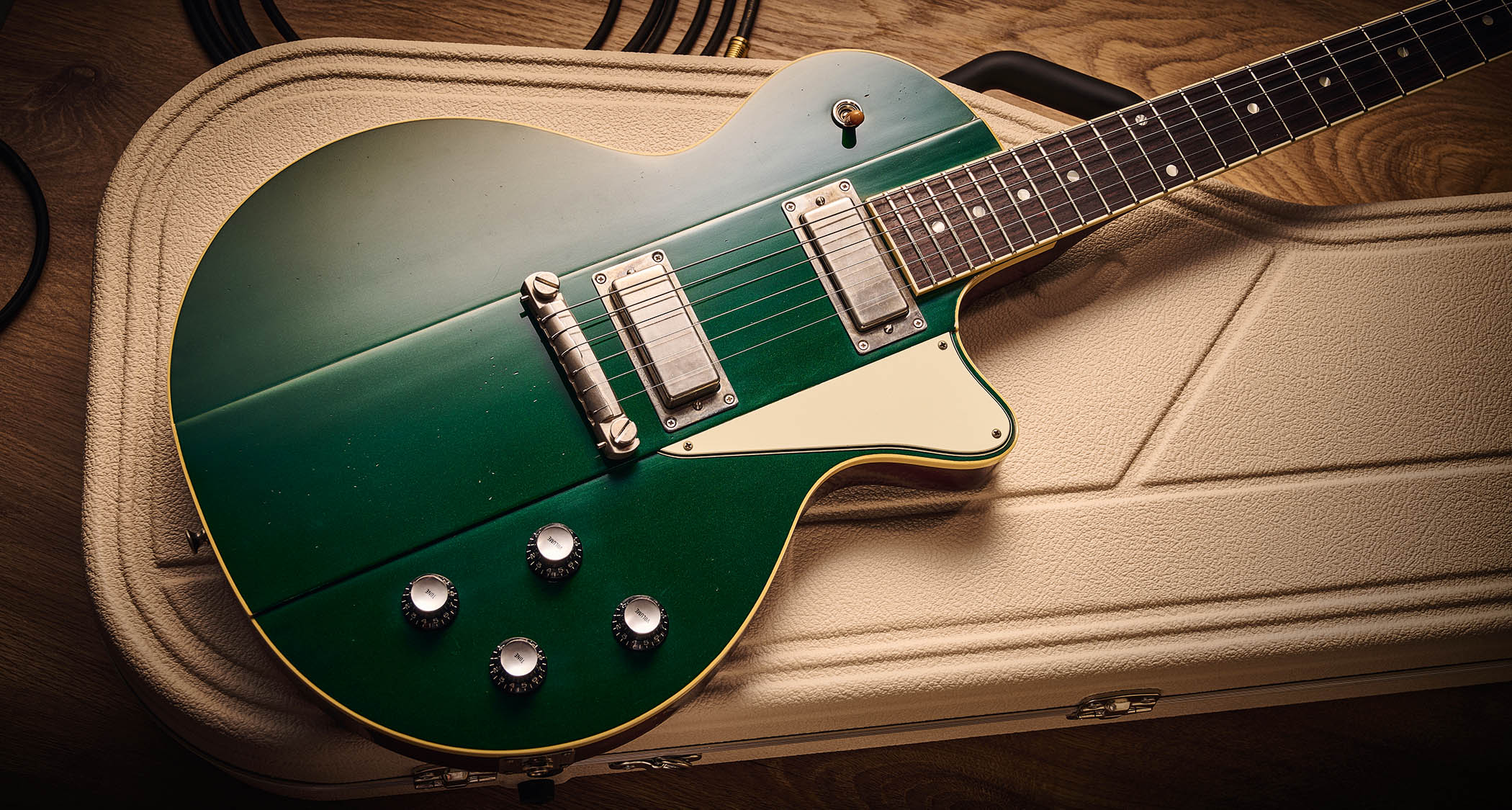Jeff Bridges: “What's great about the guitar is that it's very honest. The more you put in, the better you get“
We meet the original Dude to talk songwriting and his new Breedlove signature acoustics

Music was Jeff Bridges’ first love, since discovering the joys of the guitar while still at school in the early 60s. Initially torn between pursuing a career as a musician or an actor, he harboured ambitions of transitioning between the two.
His debut album, Be Here Soon, was released in 2000, but it wasn’t until his Oscar-winning role in Crazy Heart in 2009 that he was finally able to fully showcase his musical abilities. His portrayal of an alcoholic country singer in decline pointed the way to the country/Americana route he has continued to follow with his own music.
Since the release of his self-titled album on the Blue Note label in 2011, Bridges has toured consistently with his band, the Abiders, named after his character in The Big Lebowski.
I haven’t performed live as an actor in front of an audience for a long time. The way you feed off an audience’s energy is something that you don’t get from making a movie
A staunch advocate for environmental issues, Bridges has now teamed up with US guitar builder Breedlove to launch a range of signature models that are built entirely from sustainable woods. Bridges’ royalties for all guitars sold are being donated to the Amazon Conservation Team charity.
You’ve been playing the guitar for most of your life and music is obviously very important to you. What is it that music does for you that acting doesn’t? Do they feed your soul in different ways?
“There are more similarities than differences, really. They both share a solitary element, either practising your instrument or learning your lines and preparing a role. Then you have the teamwork aspect. There is nothing like getting together with a great band to hang out with each other and play, and making a film is very similar, in that you are again working with an ensemble of other players.
“I guess the only lack of comparison for me these days is that while I have the live dimension of playing gigs, I haven’t performed live as an actor in front of an audience for a long time. The way you feed off an audience’s energy is something that you don’t get from making a movie.”
All the latest guitar news, interviews, lessons, reviews, deals and more, direct to your inbox!
You said that in your early days when you were unsure whether to pursue music or acting, your father, Lloyd Bridges, suggested that if you became successful as an actor you could move into music. Of course, it can be hard to cross over from acting to music as there is often a lot of resistance from audiences…
I’m certainly glad that I followed my father’s advice and stuck with the acting. He said, ‘Don’t worry, Jeff. You’ll be able to explore all of your interests as an actor,’ and that eventually came to pass
“I think that’s true. I’m certainly glad that I followed my father’s advice and stuck with the acting. He said, ‘Don’t worry, Jeff. You’ll be able to explore all of your interests as an actor,’ and that eventually came to pass a long time later with Crazy Heart in 2009. Of course, I had done The Fabulous Baker Boys with my brother [Beau] in 1989, but I played a pianist in that rather than a guitarist. I hear what you’re saying, though, there is a rift.
“People say the same kind of thing the other way around as well, with musicians who want to go into movies. There’s always the concern that it might be seen as some kind of vanity project whichever direction you cross from. Crazy Heart worked out real well for me. I had such a great experience that after that I thought, ‘Gee, if I ever wanted to realise my high school dream of having a band, now is the time to do it.’ [Laughs]”
Your first solo album, Be Here Soon, was redolent of some of the later work of Clapton and Steve Winwood, and was very different from the music you played in Crazy Heart and on your subsequent albums and shows. Was that due to the influence of Michael McDonald who worked with you on that?
“A lot of the tracks on that album were very early songs of mine, or songs written with my good friend John Goodwin, who I’ve been buddies with since we were in the fourth grade at school. It was wonderful when Michael came into the picture and brought so much to what we did, but those songs we recorded were already written for the most part.”
Crazy Heart opened up a credible route into performing and recording for you, and the country/Americana genre seems to have served as the blueprint for your work since then. Is that the style you feel most comfortable with?
“Yes, I think so. I’m open to all sorts of music, though, be it jazz or the American songbook kind of things. There’s a lot of wonderful music to explore at some point in the future perhaps.”
Talking to you about guitars and playing makes me feel really fired up to get into some lessons and work on a few things
There seem to be two schools of guitar players: those who practise to improve their abilities and those who tend to use the guitar as a tool, the ‘I only play to write songs’ guys. Which are you?
“[Laughs] I know exactly the kind of thing you mean, man! Practice, man, that’s the whole deal. That makes a huge difference. A friend of mine is a wonderful guitarist and he emailed me yesterday to ask if I’d like some lessons via Zoom. I’m definitely going to get into that.
“I’m not much of a lead player – I mainly play rhythm when I’m singing. I know the better my chops are the better my writing is. I think what is great about the guitar is that it is a very honest instrument. The more you put in, the better you get.”
Did the guitar come easily for you when you started? What were the things you worked on and that, once mastered, made you feel like you’d reached a decent standard?
“I picked it up fairly quickly, actually. Not as quickly as my daughter Jessie, though! I showed her some things and she got it right away. Even the open F chord, which a lot of us struggle with at first, she had no problem with it whatsoever, no buzzing or dead notes. She couldn’t understand why I was so excited at that!
“Actually, talking to you about guitars and playing makes me feel really fired up to get into some lessons and work on a few things. But oh man, the first songs… [laughs] working my way through The Beatles and Bob Dylan were important stages.
“I first got into music through my brother, Beau, who is eight years older than me. He was into rock ’n’ roll – Little Richard, Chuck Berry and Buddy Holly – and their songs were also part of my repertoire.”
One of my favourite guitars is a Gibson Roy Smeck. That is a very unique guitar; there is something special about that neck
What guitars have you picked up and played over the years?
“When I first started playing guitar, I played my brother’s Danelectro. My dad had a Goya acoustic as well, which I liked to play. My main guitars currently are Breedloves, and the Gretsch Country Gentleman that I played in Crazy Heart. I still have a few Gibson J-25s from over the years. One of my favourite guitars is a Gibson Roy Smeck. That is a very unique guitar; there is something special about that neck. I’ve got a few Teles as well.”
If you had to grab one guitar in a fire – and we know you’ve actually had a bad experience with a fire burning your house down – what would it be?
“Whatever is closest at hand and get out of there! I’ve had a few experiences of that, and I can tell you, you don’t have time to think about anything much [laughs]. Chances are it might well be one of my new Breedloves.”

Were you a Breedlove player prior to the idea of a signature model coming up?
“No. Actually, Chris Pelonis, who is the musical director of my band, turned me on to these guitars. He owns a guitar shop near Santa Barbara and he’d been selling Breedlove guitars for some time.
“He said to me that I really needed to check them out, so I played one and I was just amazed at the sound and playability. He suggested that I meet with Tom Bedell, who is the owner of Breedlove, as he thought we would have a lot in common.
“Tom was passionate about the concept of making great guitars from sustainable trees and his fondness for myrtlewood, which grows along the Oregon coast, where Breedlove is based. I told him that I’d been thinking about getting a signature guitar made so that I could express some of my thoughts through the instrument, and I suggested we get in cahoots and make these guitars together.
“Chris added some expertise as well. I wanted to add the words ‘all in this together’ on the front of the neck as it summed up my philosophy on life. I was thinking about the planet when I first came up with the phrase – but of course it rings true for the pandemic and even the way we’re having these raging wildfires, which are causing so much destruction.”

What was your primary acoustic before you moved to Breedlove?
“I love the Gibson J-45, that was very much the go-to sound that I had in mind. I explained that to the guys and that became the starting point for what I was looking for.”
Tom was passionate about the concept of making great guitars from sustainable trees and his fondness for myrtlewood, which grows along the Oregon coast, where Breedlove is based
Breedlove offers a range of guitars aimed at either fingerpickers, pick users or players who cover both options. Where do your models fall on that range?
“They’re aimed at the all-rounder rather than being specifically tailored to one approach. I play both ways myself. The first guitar was the flagship Oregon Concerto Bourbon signature model, which is the most expensive one in the range at about $2,500.”
Are there any plans to expand the concept into difference price ranges?
“Yes, there are also a couple of other more affordable signature models in what they call their ‘organic’ collection made entirely from sustainable woods. One made from granadillo from the Amazon with a spruce top that goes for about 1,000 bucks and another made from mahogany from the Congo, again with a spruce top.
“That goes for about 700 bucks. I thought it was really important to have a range of more affordable models as it really helps spread the message if a much broader range of players can afford these great guitars.”
You’ve worked with a lot of your heroes over the years, including Bob Dylan on the 2003 film Masked And Anonymous. Did you get the chance to talk music or play with him at that time?
“What a wonderful experience that was. Not too many people have seen that movie. I actually think Bob is a really great actor. Larry Charles, the director, put me in charge of the acting. He suggested that I get together with Bob and we do some acting ‘practice’ together for half a day. I had a great time hanging out with him.
“It was almost like playing as kids or something, you know? One day I had a knock at my trailer door. It was Bob and he said, ‘Hey, do you wanna pick?’ We played a few tunes; I was so nervous that my hands were shaking [laughs]! I’ve had wonderful opportunities to play with some other great guys like David Crosby, who is a buddy, and Jackson Browne.”
I had a great time hanging out with Bob Dylan. We played a few tunes; I was so nervous that my hands were shaking
It’s almost 10 years since your last album. Have you got another one in the pipeline?
“Yeah, I’ve got a pile of songs. There will definitely be another album and live shows when things eventually come back again. I sure hope the live music scene comes back again.”
You always seem very happy and appreciative of the success you’ve achieved, both personally and professionally. Is there anything you wish you’d done differently?
“When I look at Chris Pelonis in my band and I see the ability that he has, I do regret that I didn’t spend more time woodshedding, particularly when I was a kid. I guess I regret that I didn’t maintain a high level of practice regime consistently over the years since I first started to play.
“I am very fortunate to have the family and friends that I’ve got, the career that I’ve had, and of course now that the music thing has kicked in for about the last 10 years or so, I feel pretty damn lucky. I couldn’t ask for more, man.”
Mark is a freelance writer with particular expertise in the fields of ‘70s glam, punk, rockabilly and classic ‘50s rock and roll. He sings and plays guitar in his own musical project, Star Studded Sham, which has been described as sounding like the hits of T. Rex and Slade as played by Johnny Thunders. He had several indie hits with his band, Private Sector and has worked with a host of UK punk luminaries. Mark also presents themed radio shows for Generating Steam Heat. He has just completed his first novel, The Bulletproof Truth, and is currently working on the sequel.

